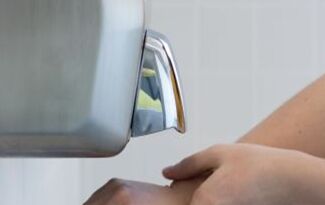研究证实 喷气式烘手机的卫生程度远低于传统纸巾
Jet hand dryers spread dangerous bacteria around bathrooms and are significantly less hygienic than traditional paper towels, scientists have found.
科研人员日前发现,喷气式烘手机会在卫生间内传播危险的细菌,卫生程度远低于传统的纸巾。
An international study in hospitals established that modern dryers create an aerosol effect, blasting E. Coli as well as traces of faeces and the bacteria responsible for septicaemia onto surfaces.
一项在医院内进行的国际研究证实,现代烘手机会产生一种雾化效果,将大肠杆菌、微量排泄物和引发败血症的细菌吹到物品表面上。
While the devices can often be activated without being touched, which is supposed to improve hygiene, they are problematic because people fail to properly wash their hands, the experts said.
专家称,虽然这种设备通常可以不用手触摸便自行启动--这本应提高卫生度--但由于人们没有以恰当的方式洗手,这些设备还是会带来问题。

This leaves harmful bacteria on the surface of the skin ready to be blown around the room.
不以恰当的方式洗手会在皮肤表面留下有害细菌,它们会被吹到房间各处。
By contrast, paper towels absorb the bugs better, preventing other people from becoming exposed to them.
相比之下,纸巾能更好地吸收细菌,避免其他人受到污染。
Published in the Journal of Hospital Infection, the study, the largest of its kind, was partly carried out at Leeds General Infirmary.
该研究发表在英国《医院感染杂志》上,是同类研究中规模最大的,部分研究工作是在利兹综合医院进行的。
Department of Health guidance says air dryers should only be placed in public rather than clinical areas of the hospital, but only because of concerns around the noise.
卫生部指导称,烘手机应当只放置在公共场所而不是医院的临床区域,但这样做仅仅是因为担心噪音。
The study authors wrote the rules on the use of jet dryers need to be strengthened on the in the light of the new evidence.
这项研究的作者写道,根据新的证据,使用烘手机的规则需要加强。
"The problem starts because some people do not wash their hands properly," said Professor Mark Wilcox, who led the study at the University of Leeds. "When people use a jet air dryer, the microbes get blown off and spread around the toilet room."
研究带头人、利兹大学的马克·威尔科克斯教授说:“会出现这一问题是因为人们不好好洗手。当人们使用喷气式烘手机时,微生物被吹走,弥漫到卫生间各处。”
"In effect, the dryer creates an aerosol that contaminates the toilet room, including the dryer itself and potentially the sinks, floor and other surfaces, depending on the dryer design and where it is sited. If people touch those surfaces, they risk becoming contaminated by bacteria or viruses."
“事实上,烘手机会产生一种喷雾,污染卫生间各处,包括烘手机本身以及水池、地板和其他表面,这取决于烘手机的设计和安放位置。如果人们接触这些表面,他们可能会被细菌或病毒污染。”
The study looked at bacterial spread in a real world setting -- in two toilets in each of three hospitals, which were in the UK, France and Italy.
这项研究分析了真实世界中的细菌传播场景--科研人员在三家医院各选择了两间卫生间,这三家医院分别位于英国、法国和意大利。
Each of the toilets had paper towel dispensers and jet air dryers, but only one of these was in use on any given day.
每个卫生间都有纸巾取用器和喷气式烘手机,但在特定的一天只有一台设备可用。
On each day, over 12 weeks, levels of bacterial contamination in the toilets were measured, allowing comparisons to be made when either paper towels or jet air dryers were in use.
在超过12周的试验期内,每一天,科研人员都会测量卫生间内细菌污染水平,将使用纸巾和使用喷气式烘手机的情况进行对比。
Samples were taken from the floors, air and surfaces in each of the toilets. The main target bacteria were Enterobacteria including Escherichia coli or E.coli, which cause a wide range of infections including gastroenteritis, pneumonia and septicaemia, and enterococci -- bacteria that can cause difficulty when treating infections.
科研人员从每个卫生间的地板、空气和物品表面取样。他们瞄准的细菌主要是包括大肠杆菌(它们会引发广泛的感染,包括肠胃炎、肺炎和败血症等)和肠球菌(有这种细菌存在便很难治疗感染)在内的肠细菌。
They also looked for Staphylococcus aureus, which is responsible for a range of conditions, from minor skin and wound infections to life-threatening septicaemia.
科研人员还试图寻找金黄色葡萄球菌,该细菌会引发一系列疾病,包括较轻微的皮肤和伤口感染和危及生命的败血症。
Across the three hospitals, bacterial counts were significantly higher in the toilets on the days that jet air dryers were in use.
在三家医院中,卫生间的细菌数在使用喷气式烘手机时都明显要多一些。
"We found multiple examples of greater bacterial contamination on surfaces, including by faecal and antibiotic-resistant bacteria, when jet air dryers rather than paper towels were in use," Professor Wilcox said.
威尔科克斯教授表示:“我们发现许多在使用喷气式烘手机时表面细菌污染更严重的例子,包括肠球菌和多重抗药性细菌,明显比使用纸巾时多。”